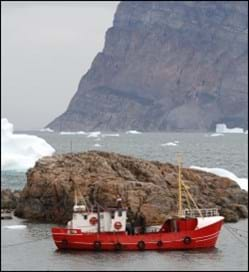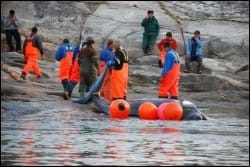A coherent focus on industries and the labour market – at national, regional and municipal level – is crucial to ensure a sustainable development of the municipalities, resulting in a strong economic foothold. Climate changes will generate both challenges and new opportunities – changes we have to live with and by within the primary trades: Fishing and tourism.
Fishing is the most important trade in Greenland – also in Avannaata Kommunia. In recent years, there has been much attention on increasing profits in the fishing industry – especially for the Greenland halibut – focusing on securing sustainability both in terms of economy and resources. The present trend points in the direction of larger modern fishing boats, placing pressure on traditional small boat fishing. On top of this, climate changes will influence fish species in terms of presence, habitats and population. Even small changes can have large consequences for the trade, which might have to adjust its fleet, tools and onshore facilities. On the other hand, new possibilities for development and earnings might arise, demanding attention and action.
In recent decades, the tourism industry in Greenland has experienced significant growth. In Avannaata Kommunia, we are aware of the unique qualities and potentials that we have in Northwest Greenland. Ilulissat ice fiord, a UNESCO World Heritage Site, is a large attraction, and the area around Disko Bay has seen a large and professional tourism industry evolve in recent years. However, there is significant potential for growth. With the new Icefjord Centre, a renewed and greater focus will be on the tourism industry in the municipality in the future. Climate changes can prolong the tourist season and make it possible to develop new attractions further north, e.g. extreme tourism and dark tourism.
The Raw Minerals sector in regard to oil, gas and minerals, in the longer term, may be of greater importance for the development of municipal business and becoming a third primary industry in the future. Ice and water production are other potential raw material trades. There will be a strong focus on education and learning in the coming years, in order for the raw material sector to become a new primary industry in the future. However, with Planning Strategy 2017 it has been emphasized that the municipality currently has two main occupations; fishing and tourism.
Independent small businesses include, among other things, sealing and whaling – the original Greenlandic and arctic trade. For centuries, the sealing and whaling culture has played an important role in Greenland – financially, socially, culturally and identity-wise. Small towns and settlements still depend on local sealing and whaling, but the profession is under severe pressure and the number of sealers and whalers is declining due to climate changes etc. However, it is important to further motivate and commit independent businesses and entrepreneurs in Avannaata Kommunia. This is to be supported by means of a co-operation between the municipality, Destination Avannaa and local businesses. For instance, an enterprise house could provide diverse settings for innovation, counselling, co-operation and knowledge exchange.
Climate changes will make it possible to grow other and more varied agricultural produce in Greenland than previously. The municipality wants to continue to explore and stimulate any potential in Northwest Greenland, e.g. through spatial planning.
Goals
- The focus is primarily on the fishing and tourism industries, and potentially in longer -term the mineral sector, as well as exports to local foods, including water and ice.
- To ensure that future expansions of airports and port facilities, can meet future needs and development opportunities, including being able to receive large aircraft and fishing vessels, cruise ships, and air and shipping traffic related to both the tourism industry and the raw materials industry.
- The municipality’s status as the leading tourist region in Greenland is to be maintained and enforced, among other things by means of area allotment and an improved infrastructure, facilitating development of both existing and new tourist facilities and attractions.
- Minor projects are launched to promote the tourism industry, including urbanization and improved access, which will help to boost tourism in all parts of the municipality.
- Tourism industry must be developed and rethink, to spread the tourism attractions further north in the municipality. This is a goal of innovation and development of new tourism concepts to promote the industry in the future.
- A tourism policy must be drawn up based on the municipality's established strengths, and sets concrete goals for development throughout the tourism value chain and the development of attractive destinations to attract and retain more tourists.
- Ensuring areas and framework for a targeted, broad development of industry, while focussing on sustainability and climate adjustments. One of the means to this end will be a mapping of the development potentials for businesses and industries in the towns and settlements throughout the municipality.
- Strengthening the framework for business and industrial development by ensuring smooth, high-quality and consistent area administration in the entire municipality.
- Integrating the tourism industry in the planning of the open country.
- Supporting, through the town plan, the continual development of the offshore and mineral industries, including areas for utilisation of natural resources.
- The municipal council is to investigate the possibilities for establishing an enterprise house and an oil business office, which area to act as the centre for entrepreneur counselling and handling of offshore-related activities.
- Integrating with advantage the activities of an enterprise house with supplementary training and up-grading activities in order to create a larger supply of qualified labour and initiate the transformation of the sealing, whaling and hunting trade – specifically in the settlements.
- Ensuring room for allotting areas for experimental farming. Experience from test plantation is to be included in future planning, including experience in terms of selecting areas sheltered from the wind etc.





